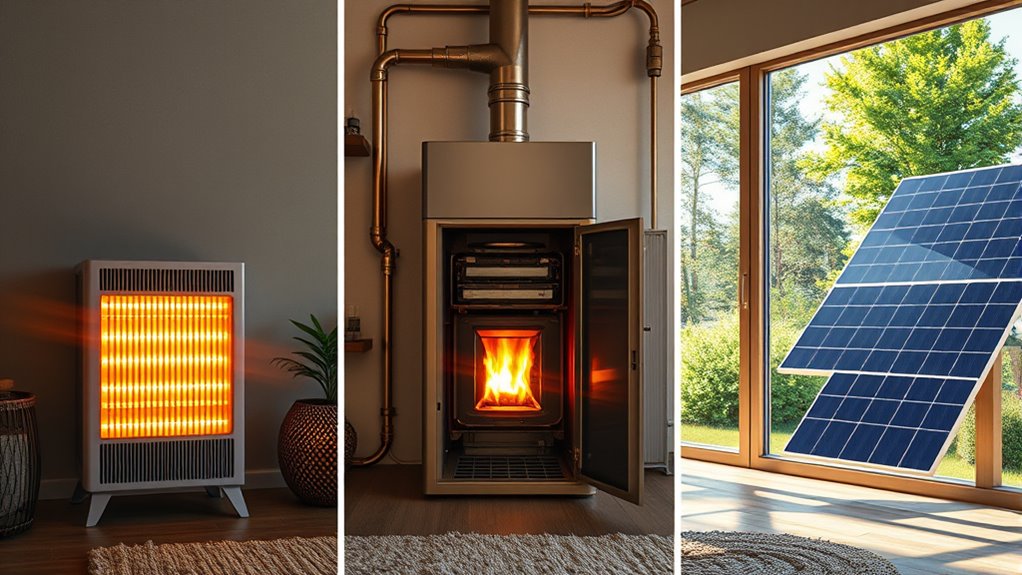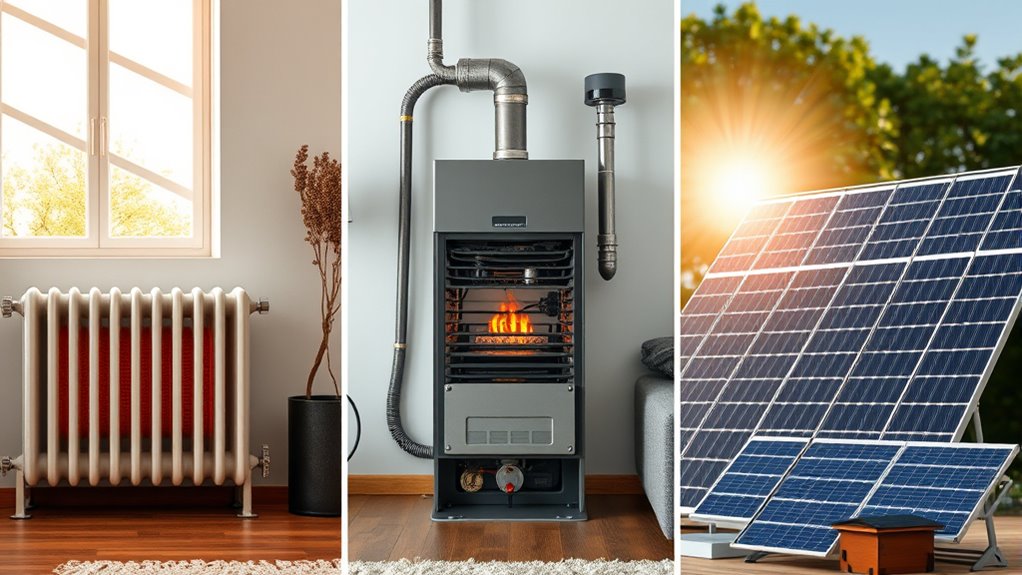When choosing a heating system, consider electric, gas, and solar options. Electric heaters are easy to install and affordable upfront but can cost more to operate long-term. Gas systems need professional installation and higher initial costs but save money on fuel, especially in colder areas. Solar heating has high upfront expenses but offers significant savings and sustainability over time. Want to find out which system suits your home best? Keep exploring for more details.
Key Takeaways
- Electric systems are easy to install but have higher long-term operating costs, especially in cold climates.
- Gas heating offers lower operational costs and is suitable for larger or colder homes but requires professional installation.
- Solar heating involves high upfront costs but can provide significant energy savings and sustainability benefits over time.
- Installation complexity varies: electric is simplest, gas needs gas lines, and solar requires extensive setup and sunlight assessment.
- Long-term savings depend on regional energy prices, climate, and system efficiency, influencing the most cost-effective option.

Are you exploring different ways to keep your home warm? Deciding between electric, gas, and solar heating systems can feel overwhelming, but understanding the key factors like cost comparison and installation requirements can help you make an informed choice. Electric heaters are often the simplest to install, especially if your home already has the necessary wiring. They typically require minimal setup, generally just plugging in portable units or installing wall-mounted panels. This ease of installation translates to lower upfront costs and fewer disruptions. However, over time, electric heating can be more expensive to operate, particularly in colder climates where high electricity bills can add up quickly.
Electric heaters are easy to install but may cost more to operate long-term.
Gas heating systems, on the other hand, involve more complex installation requirements. You’ll need to connect to a natural gas line or install a propane tank, which can involve considerable initial work and costs. The installation process often requires a licensed professional to ensure safety and compliance with local codes. While the upfront investment might be higher than electric options, gas systems usually offer lower operating costs because natural gas tends to be cheaper than electricity in many regions. This cost comparison can make gas heating more economical over the long term, especially for larger homes or those in colder areas where consistent, powerful heating is necessary.
Solar heating systems present a different set of considerations. The installation requirements are more extensive and costly initially, as you’ll need solar panels, specialized collectors, and possibly battery storage. The installation process can be complex, requiring professional assessment to determine your home’s solar potential and to design an efficient system. Despite the higher upfront costs, solar heating can considerably reduce your ongoing energy expenses, especially if you have ample sunlight. Many regions also offer incentives or rebates that can offset some of the installation costs. Over time, solar systems can be highly cost-effective, but they depend heavily on your location, roof orientation, and the amount of sunlight your area receives.
Additionally, juice cleansing and detox is a popular health trend that emphasizes the importance of nutrient-rich ingredients, which can also be considered when designing a sustainable and health-conscious home environment. When comparing these options, think about your budget, the available infrastructure, and your long-term energy goals. Electric systems are best if you want quick, low-cost installation and are comfortable with higher operating costs. Gas systems suit those seeking a balance between initial investment and ongoing savings, especially in colder climates. Solar heating appeals to environmentally conscious homeowners willing to invest more upfront for potential long-term savings and sustainability benefits. Each choice involves trade-offs, so weigh the cost comparison against installation requirements and your specific needs to find the best fit for your home.
Frequently Asked Questions
Which Heating System Is Most Environmentally Friendly?
You’ll find that solar systems are the most environmentally friendly heating option because they use renewable energy, reducing reliance on fossil fuels. By choosing solar, you contribute to emission reductions and lower your carbon footprint. Electric systems powered by renewable energy sources are also eco-friendly, but solar is preferable for sustainability. Gas systems emit more greenhouse gases, making them less eco-conscious. So, if minimizing environmental impact matters, go for solar or renewable-powered electric systems.
How Do Initial Installation Costs Compare Among Options?
Installing a heating system is like planting a tree—you need to contemplate the upfront expenses first. Electric systems usually have lower initial costs, making your cost analysis easier. Gas systems tend to be more expensive initially, with higher installation costs. Solar options often require a bigger investment upfront, but can save you money long-term. So, your choice depends on your budget and your willingness to invest early for future savings.
What Are the Long-Term Maintenance Requirements?
You’ll find that maintenance frequency varies: electric systems generally need less upkeep, while gas units may require annual inspections. Solar systems have minimal maintenance, mainly cleaning and occasional checks. Repair costs can differ too; electric and solar options typically cost less to fix, whereas gas systems might need more frequent repairs due to complex components. Overall, choosing a low-maintenance system can save you time and money in the long run.
Can These Systems Be Integrated With Smart Home Technology?
Think of your heating system as the brain of your home’s comfort. Yes, these systems can be integrated with smart home technology. You can install smart thermostats and enable automation integration, allowing you to control your electric, gas, or solar setup remotely. This makes managing your heating more efficient, personalized, and responsive, turning your home into a smart, cozy sanctuary that adapts perfectly to your lifestyle.
Which Heating Option Offers the Fastest Heat Delivery?
Gas heating offers the fastest heat delivery, warming your space quickly thanks to its high heat output and rapid response time. When considering efficiency comparison, electric systems tend to be more efficient but may take longer to heat a room. Solar options provide sustainable energy but have slower heat delivery, making gas your best choice if speed is your priority. You’ll get warm faster with gas, especially during cold mornings.
Conclusion
Choosing between electric, gas, and solar heating is like picking the right key for your home’s cozy melody. Electric warms quickly but can drain your wallet, gas offers reliable comfort, while solar is a bright, eco-friendly star shining on your savings. Consider your needs, budget, and values—your perfect heating system is out there, waiting to turn your house into a warm, inviting haven. Find the one that sings to your lifestyle and let your home glow with comfort.









